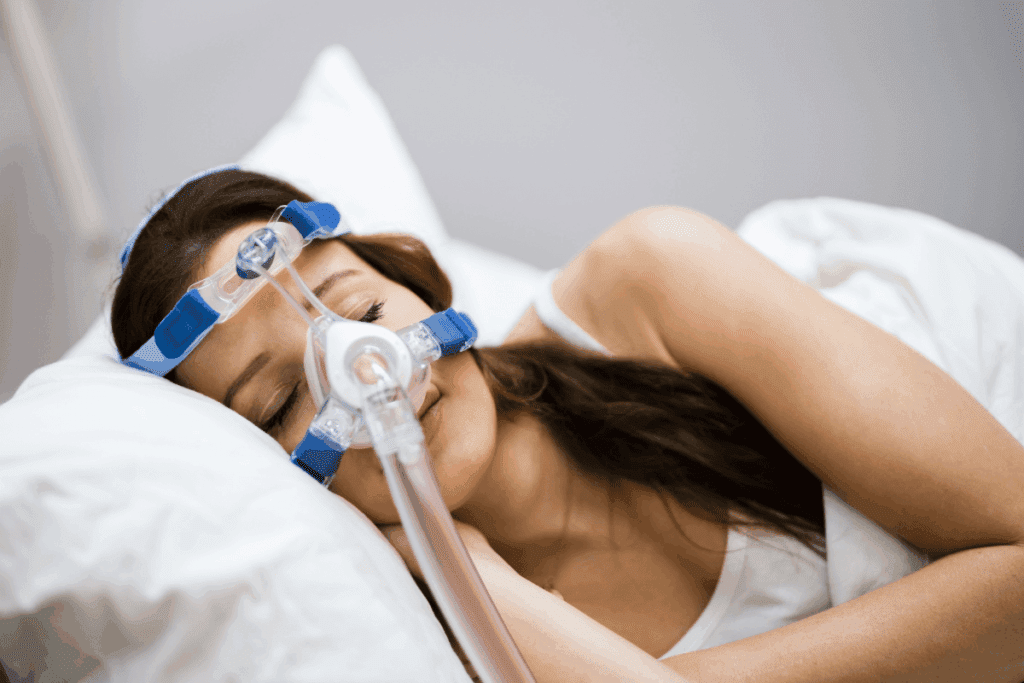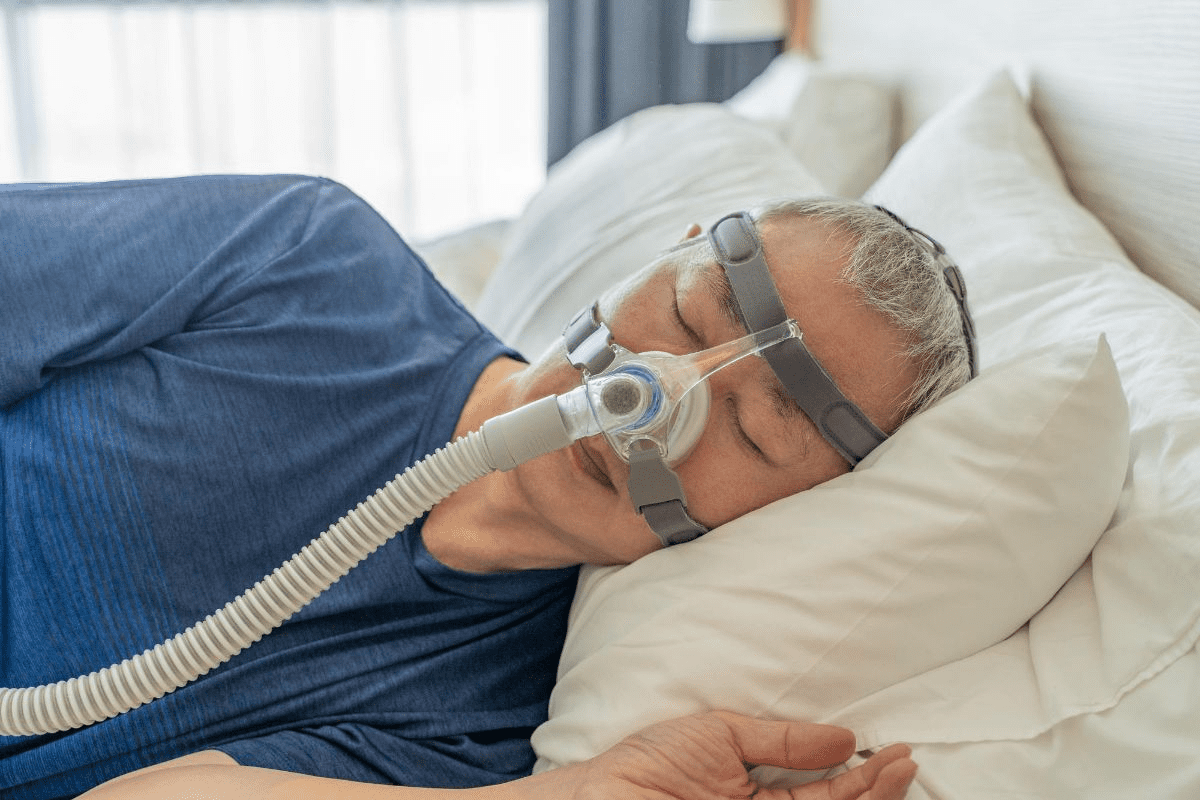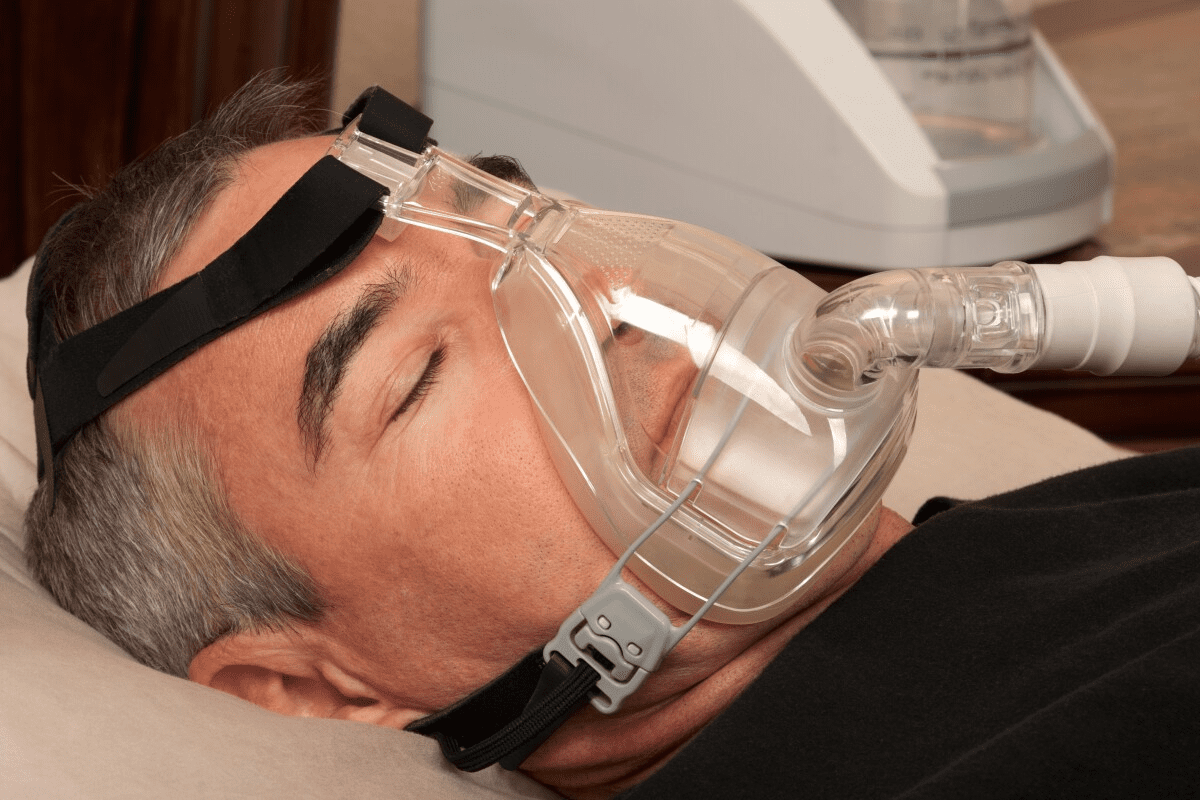Last Updated on November 27, 2025 by Ugurkan Demir

Snoring can really mess up your sleep and health. If you snore because of Obstructive Sleep Apnea (OSA), CPAP therapy is a great fix.
At Liv Hospital, we know how sleep problems can hurt your health and relationships. Our sleep medicine services tackle snoring’s root causes, like OSA. CPAP machines keep airways open while you sleep, cutting down snoring chances.
Research proves CPAP therapy greatly lowers snoring. CPAP machines keep airways open, stopping snoring. This improves sleep for you and your partner.
Does cpap for snoring work? Learn that CPAP effectively stops snoring by preventing airway collapse, but is primarily for apnea.

Snoring happens when air can’t flow freely through the nose and throat. This causes the soft tissues to vibrate. Many things can block the airway, making it important to know what causes snoring.
When we sleep, our throat muscles relax. This can narrow the airway. As we breathe, the air makes the soft tissues vibrate. This vibration is what we call snoring.
The sound of snoring can vary a lot. It can be soft or very loud, even loud enough to be heard through closed doors.
Many things can cause chronic snoring. These include:
Sleep specialists say, “Knowing why you snore is key to finding the right treatment.” Treating the cause can greatly reduce or stop snoring.
Cause | Description | Potential Treatment |
Obesity | Excess weight around the neck | Weight loss, CPAP therapy |
Nasal Congestion | Nasal obstruction due to deviated septum or sinusitis | Nasal strips, decongestants, surgery |
Anatomical Abnormalities | Narrow airway or enlarged tonsils | Surgery, oral appliances |
In some cases, snoring can mean a serious problem, like obstructive sleep apnea (OSA). OSA happens when the airway is blocked during sleep, causing breathing pauses. If you snore loudly and have pauses in breathing or other symptoms like morning headaches or feeling very tired during the day, see a doctor. They can check if your snoring is a sign of a bigger health issue.
“Snoring is not just a minor annoyance; it can be a sign of a significant health problem. If you’re concerned about your snoring, seeking medical advice can lead to effective treatments and improved health outcomes.”
Understanding snoring and when it might be serious helps us find a solution. This might include CPAP therapy for sleep apnea or other treatments based on the cause.

It’s important to understand how sleep apnea and snoring are linked. Snoring is a common symptom of sleep apnea. This condition causes breathing to stop and start during sleep.
Obstructive Sleep Apnea (OSA) is different from simple snoring. Snoring happens when the airway vibrates during sleep. But OSA causes the airway to partially or fully block, leading to pauses in breathing.
Treating sleep apnea often helps with snoring too. This is because it tackles the main cause of both problems.
Simple snoring doesn’t block the airway as much as OSA. But, long-term snoring might mean sleep apnea is present. So, it’s key to diagnose and treat it right.
Several factors increase the risk of sleep apnea-related snoring. These include:
Knowing these risk factors helps spot who might need sleep apnea tests. This could lead to treatments like CPAP therapy.
CPAP therapy can greatly reduce or stop snoring in many cases. It works by keeping the airway open. This prevents the collapse that causes snoring and sleep apnea.
CPAP therapy improves sleep quality and cuts down snoring. Research shows CPAP is very effective in reducing snoring in sleep apnea patients. It makes life better for the person and their partner.
CPAP therapy is key for those with sleep apnea and snoring. It uses a CPAP machine to send air through a mask. This keeps the airway open during sleep.
A CPAP machine sends air to keep the airway open. It has a few main parts:
Together, these parts ensure the airway stays open. This reduces snoring and sleep apnea.
CPAP therapy keeps airways open with constant air pressure. The pressure is set based on individual needs. This airflow:
By keeping airways open, CPAP therapy cuts down on snoring. It also improves sleep quality.
There are many CPAP devices for different needs:
Choosing the right CPAP device depends on individual needs and comfort. It’s important to talk to a healthcare professional to find the best fit.
CPAP therapy greatly improves life for those with sleep apnea and snoring. Understanding CPAP and the different devices helps make informed treatment choices.
CPAP therapy is a well-known way to treat snoring. It’s important to know how it works to understand its benefits. We’ll look into the science behind it and how it helps stop snoring.
CPAP machines send a steady stream of air through a mask that fits over your nose and sometimes your mouth. This air keeps your airway open, stopping it from closing during sleep. The pressure needed is set based on your specific needs, found through sleep studies.
CPAP works by keeping the airway open. This stops the soft tissues in your throat from vibrating, which causes snoring. It does this by ensuring smooth airflow through the open airway.
CPAP therapy mainly stops snoring by keeping the airway from collapsing. When the airway closes, the soft tissues in your throat vibrate, leading to snoring. CPAP keeps the airway open, stopping this collapse.
This is very helpful for people with obstructive sleep apnea (OSA). OSA causes the airway to collapse many times during sleep. CPAP is very effective in treating OSA and reducing the snoring it causes.
Snoring happens when soft tissues in your throat vibrate as air passes through a narrow airway. CPAP stops this vibration by keeping the airway pressure steady. This prevents the tissues from vibrating.
This leads to a big drop or even complete stop in snoring. The airway stays open, allowing for smooth airflow. This reduces the chance of tissue vibration.
Benefits of CPAP Therapy | Description |
Prevents Airway Collapse | Maintains open airway during sleep, reducing snoring. |
Eliminates Tissue Vibration | Reduces or eliminates snoring by preventing soft tissue vibration. |
Improves Sleep Quality | Enhances overall sleep quality by ensuring consistent airflow. |
Understanding how CPAP therapy works helps see its value in fighting snoring. It prevents airway collapse and stops tissue vibration. CPAP machines are a complete solution for those who snore.
Studies have shown that CPAP therapy greatly reduces snoring in people with sleep apnea. CPAP machines keep the airway open, preventing collapse that causes snoring.
Research shows CPAP therapy is effective against snoring, mainly in those with obstructive sleep apnea. The machine keeps the airway open, stopping tissue vibration that leads to snoring sounds.
So, does a CPAP stop snoring? Yes, it does. Knowing how CPAP works helps people choose the right treatment. CPAP is a proven effective treatment for sleep apnea-related snoring.
We know that everyone’s experience with snoring and CPAP is different. But, the evidence supports CPAP’s role in reducing snoring. It’s a valuable option for those dealing with this issue.
Yes, a CPAP machine can greatly reduce snoring. It does this by keeping the airways open during sleep.
Yes, CPAP therapy is a common treatment for sleep apnea. It helps by preventing airway collapse, which reduces snoring.
While CPAP therapy is mainly for sleep apnea, it can also help with snoring. It keeps the airway open, even without sleep apnea.
A CPAP machine delivers air pressure through a mask. This keeps the airway open, stopping the vibration that causes snoring.
There are many CPAP devices, like standard CPAP machines and auto-adjusting ones. There are also BiPAP machines for treating snoring and sleep apnea.
Yes, studies show CPAP therapy can greatly reduce snoring. This is true, even for those with sleep apnea.
Not everyone who snores needs a CPAP machine. But, if your snoring is due to sleep apnea or is severe, a doctor might suggest it.
CPAP therapy can greatly reduce snoring. In some cases, it might even stop snoring completely. This happens when used correctly and consistently.
National Center for Biotechnology Information. (2025). Does CPAP Stop Snoring What You Need to. Retrieved from https://www.ncbi.nlm.nih.gov/pmc/articles/PMC5406953
Subscribe to our e-newsletter to stay informed about the latest innovations in the world of health and exclusive offers!